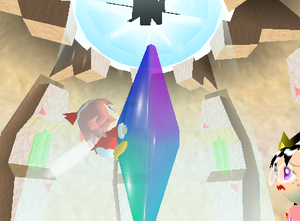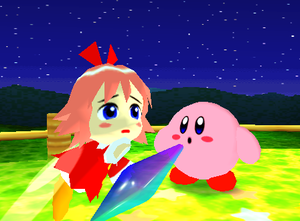Kirby 64: The Crystal Shards
Kirby 64: The Crystal Shards is a platformer featuring Kirby and some of his friends. It was produced by HAL Laboratory and released in 2000 for the Nintendo 64. It is notable for being the first installment in the Kirby series to depict Kirby and his surroundings in full 3D, although only for visual effects. Also the development of this game was not directed by Masahiro Sakurai.
Story
The story of Kirby 64: The Crystal Shards begins on a far away planet called Ripple Star, which is inhabited by fairy-like beings. The inhabitants of Ripple Star are also the guardians of a powerful crystal. Shortly before the game begins, an ill-willed creature called Dark Matter attacks Ripple Star. Concerned with the crystal's safety, the Fairy Queen asks Ribbon, a young fairy, to take the crystal and escape to a safe place with it. Ribbon obeys to the ruler's will, but as she flies off, she is pursued by Dark Matter. Eventually, the powerful being is able to assault Ribbon, which destroys the crystal and splits it into several Crystal Shards. Meanwhile, Ribbon crash-lands on Pop Star, Kirby's home planet.
It is not for long until Ribbon meets Kirby, since she unintentionally uses him to break her fall. After both of them find and merge two of the Crystal Shard's, Ribbon explains her misery to Kirby, who instantly agrees to help out. While they search for the missing shards on Pop Star, they manage to add a Waddle Dee, an artist girl called Adeleine, and even Kirby's arch rival King Dedede to their cause. The group then travels to several planets to look for shards, using the crystal's transportation powers.
After travelling through several regions on numerous planets, the group finally gets the chance to travel to Ripple Star. The planet has become covered in thick, black clouds and is generally in a bad state. The Fairy Queen herself has been possessed by Dark Matter, which the group remains unaware of, though. Ribbon is visibly shocked to see her home planet in such a condition, but the rest of the group quickly comforts her. They then journey to Ripple Star together, where they battle their way into the palace and confront Miracle Matter, the apparent master of the Dark Matter. Kirby finally manages to defeat the foe and restores peace to the fairy planet. The Fairy Queen remains influenced by the Dark Matter though, and after Kirby and his friends leave the planet to return home in a spaceship, the queen can be seen giving a malicious glare at Ribbon.
The ending changes if Kirby and his frinds manage to find all Crystal Shards, though. If they do this successfully, the restored crystal reveals the possession of the Fairy Queen, and expells the Dark Matter from her body. The remaining Dark Matter then plies off into space, where it forms a new world called Dark Star. Intending to destroy the dark threat, the group travels into the heart of Dark Star with Kirby's Warp Star. Inside the black cloud, Kirby utilizes the abilities of his friends for one last time. Eventually, Kirby and Ribbon engage Zero Two, the master od Dark Matter and an angelic version of Kirby's old enemy Zero, in a fierce battle. The two of them manage to defeat the creature with the help of the Crystal Shards, though, and Dark Matter is eliminated. To thank the heroes for their efforts, the Fairy Queen awards each of them with a piece of the crystal. In the end, Kirby receives a kiss from Ribbon.
Gameplay
Characters
Enemies
Bosses
Locations
Copy Abilities
Regular Powers
Combination Powers

